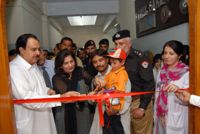PAKISTAN: Treatment Centre Begins to Break AIDS Stigma

'Today is the best day of my life,' Gul Hamid, 40, told IPS. 'Finally my family members are convinced that HIV/AIDS can’t be transmitted through handshakes or shared meals and utensils.'
Hamid tested positive for HIV/AIDS in the United Arab Emirates (UAE) two years ago and was deported immediately. Since then he has been shunned by most of the community in his village in North Waziristan, a mountainous region that borders Afghanistan.
Virtually everyone in the village refused contact with Hamid, believing that being near him, or having any physical contact with him, might lead to contamination.
'The majority of the population makes the mistaken assumption that HIV/AIDS is a condition resulting from extramarital sex and that the patients are sinners,' Rajwal Khan, a representative of the World Health Organisation (WHO), told IPS.
'They also believe that the virus can be transmitted through physical touch,' he said, adding that even doctors and health professionals are guilty of ostracising HIV/AIDS patients or avoiding contact with them.
According to Khan, Pakistan has counted over 5,000 people living with HIV/AIDS since 1990, the majority of them men who were deported from Arab countries, where they had been working as immigrant labourers.
He said that whenever immigrants visited their embassies to renew their visas or passports they were subjected to HIV tests. If they tested positive, they were deported to Pakistan.
In the absence of screening facilities at Pakistani airports, returning workers are quickly absorbed back into the country.
The shame of deportation often prevents these men from discussing their condition with family; this stigma, coupled with a lack of treatment facilities advocating safety and prevention, has led to the proliferation of the virus in certain areas.
'HIV/AIDS has become a ‘family disease’ in the Khyber Pakhtunkhwa (KP) and the Federally Administered Tribal Areas (FATA), where husbands have unwittingly transmitted the deadly infection to their wives, who subsequently give birth to HIV-infected children,' Mohamed Cisse, country chief of Health and Nutrition for UNICEF, told IPS.
On Sep. 1, the first Family Care Centre for people living with HIV/AIDS in Pakistan was inaugurated in Peshawar at the Hayatabad Medical Complex, in the hope of breaking the stigma surrounding HIV/AIDS and providing crucial treatment.
The first of its kind in South Asia, the Centre will serve as a diagnostic and treatment facility for people living with HIV/AIDS, as well as offer counseling services to affected family members, according to Cisse.
Hamid, one of the beneficiaries of the new centre, said his family received excellent counseling there and have since become much more friendly towards him.
Similarly, Sultan Sher, from the Charsadda district in KP, expressed gratitude that psychologists at the centre had managed to convince his brothers, sisters and uncles that the condition is not transmittable through just any physical contact.
'My brother, who tested positive in (the UAE city of) Sharjah one year ago, has faced a tough time since his return, including being isolated by his family,' Sher’s brother Alam told IPS.
'Now we know that HIV/AIDS is transmitted only through unsafe sex, unscreened blood transfusions, contaminated instruments in dental clinics and operating theatres or through contaminated syringes,' the brother added.
'We have to do away with the stigma associated with the disease so people stop looking down upon patients and instead encourage them to talk openly about safety and prevention,' said professor Lubna Hassan, a gynecologist and director of the Centre.
She said that Family Care provides HIV-infected women and children with all necessary treatment under one roof, including antenatal care and child care by highly trained specialists.
According to Khan there are currently 147 children and 250 women infected with HIV in the KP and FATA region.
The centre already has 600 registered patients including 175 from neighbouring Afghanistan, all of whom will receive free anti-retroviral treatment (ART) imported from the WHO in India.
A Memorandum of Understanding has also been signed with Afghanistan whereby Afghan doctors and nurses agree to receive training in Pakistan, thus qualifying them to counsel and treat patients in their home country.
In the future, the facility will double up as the Centre of Excellence for South and Central Asia, where doctors and healthcare professionals will receive training in HIV treatment and patient management, Hassan added.
She stressed that the Centre constituted a landmark achievement in Pakistan’s medical history and represented a milestone in safeguarding the rights of a vulnerable population.
Khan added that, although the KP and FATA have only counted 800 people living with HIV/AIDS in the region, testing the vulnerable population would likely reveal much higher numbers in need of treatment.
Thus far, many have refused to be tested because of the stigma attached to HIV/AIDS, an obstacle Khan hoped would be eliminated by the Centre’s work.
Pakistan is still a relatively low-prevalence country with only 0.01 percent of the population actually suffering from HIV/AIDS.
However the infection has been making inroads into large swathes of society due to high infection rates among intravenous drug users.
© Inter Press Service (2011) — All Rights Reserved. Original source: Inter Press Service

